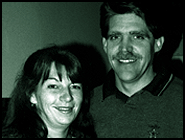A House for the Baby
to Grow in
IN THE FAMILY ROOM
of their cozy, small-town Pennsylvania home, Justy and Mike page through a photo album of the twins she gave birth to in 1996. It's the usual stuff: plump, bewildered babies tucked into colorful outfits, the faces of beaming parents, and, flipping back a few pages, the "before pictures" of Justy's belly swollen to improbable dimensions.

Click for larger view
|
Justy and Mike of Lancaster, Pennsylvania, last November. Justy is pregnant with Sumner, who was born December 14, 1997.
|
"It was big, the amazing Buddha," Mike teases. "And they were a whole four minutes apart. One looks exactly like the mother and the other exactly like the father."
Which is to say, the twin girls don't look at all like Justy and Mike. They are not the parents.
Justy carried and delivered the babies for an infertile couple from Beirut, Lebanon. She was paid a $12,000 fee. The children were conceived in a laboratory dish using the Lebanese couple's eggs and sperm. The resulting embryos were transferred to Justy's uterus.
Justy insists she was not drawn in by money. She became what is called a "gestational carrier" to help people who desperately want a child. She got involved after her sister struggled with infertility. And Justy figures that with her athletic frame and her past experience with pregnancy, she has the body for babies.
"I can't say I love being pregnant, it's just that it's always been easy for me to do," Justy says. "So far all of my pregnancies and labors and deliveries have been short and easy. So I feel if there is somebody out there who should be volunteering her body to do it, I feel like I'm one of those people."
Justy is a 37-year-old radiology technician in Lancaster, Pennsylvania. She is a wiry woman with flowing, reddish hair and a knowing smirk. Justy describes herself as a woman who craves a challenge, especially one that's unorthodox. Her husband, Mike, is an executive at a technology company and a willing supporter of her decision to carry someone else's baby. They have two school-age kids.
As she talks, Justy shifts on the couch to find a more comfortable position. She's pregnant again, this time for an infertile couple who live an hour away in suburban Philadelphia. For Justy the distinction between being a surrogate - a woman who carries a child made with her own egg - and being a gestational carrier is crucial.
"I don't think I could be a surrogate. I could not have a part of me out there that I'm not taking care of. I don't even think I could be an egg donor because I would still know that there's a part of me out there I don't know what's happening to," Justy says.
But carrying someone else's baby seem perfectly natural to her. "I just feel like an incubator or a house for the baby to grow," she says.
Next:
Fundamental Change
Surrogate Motherhood home
| 
